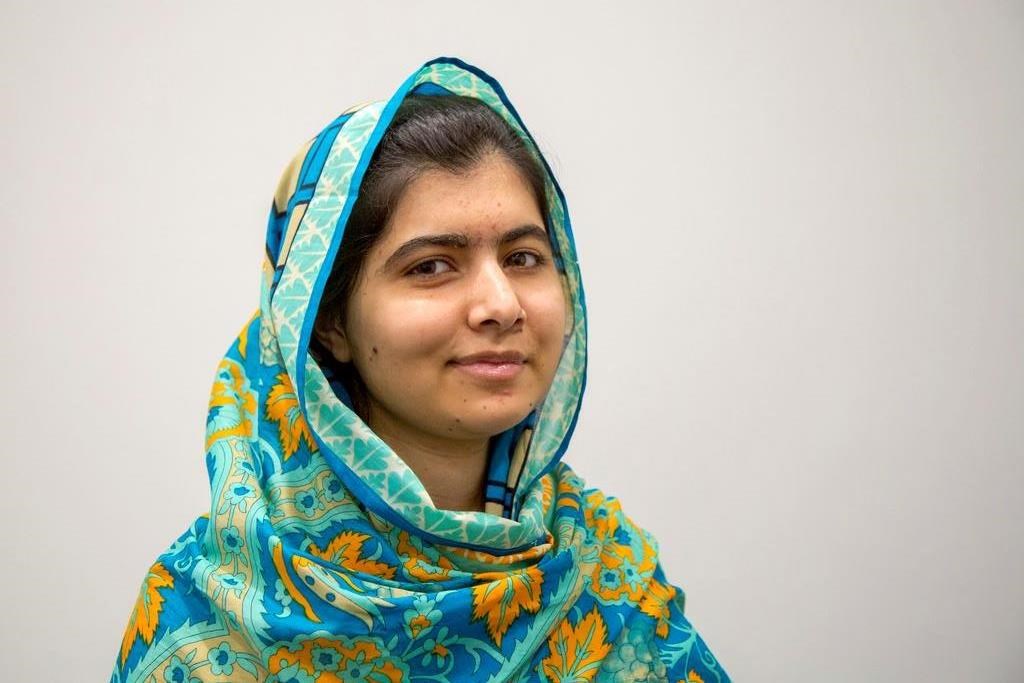 Malala Yousafzai is a young advocate for rights of females and has inspired many through her accomplishments.https://www.flickr.com/photos/dfid/22419395331“Heroes arrive when we need them most. They define us and point us in a direction.” (Granger). David Granger’s essay “Boy, do we ever need a hero?” claims that nowadays, true heroes are scarce. Those that are labeled heroes are often fictional depictions of the real idea. The author believes that people are presently in desperate need of a hero, a role model to teach us right from wrong, to succeed in life. As shown in Granger’s essay, it is clear that heroes are those who are there for us as an inspiration in our darkest times. Therefore, what should we look for in a person before deeming him worthy of our admiration? The real heroes are those who take it upon themselves to look for the problems in the world and strive to figure out how to solve them. They can be those who are just willing to help others carry a heavy box or someone who encourages people to follow their dreams. This is because these are the people who live their lives morally; they know right from wrong, and hence, attempt to aid others. The true heroes, those who are willing to help others and contribute to change, are the ones worthy of devotion. Heroism is not defined by how much money or power one has over others. It is defined through one’s influential and powerful actions. It is defined through one’s attitude with which they attack the problems that plague our society. It is defined through the admirable traits one displays, including courage and selflessness.
Malala Yousafzai is a young advocate for rights of females and has inspired many through her accomplishments.https://www.flickr.com/photos/dfid/22419395331“Heroes arrive when we need them most. They define us and point us in a direction.” (Granger). David Granger’s essay “Boy, do we ever need a hero?” claims that nowadays, true heroes are scarce. Those that are labeled heroes are often fictional depictions of the real idea. The author believes that people are presently in desperate need of a hero, a role model to teach us right from wrong, to succeed in life. As shown in Granger’s essay, it is clear that heroes are those who are there for us as an inspiration in our darkest times. Therefore, what should we look for in a person before deeming him worthy of our admiration? The real heroes are those who take it upon themselves to look for the problems in the world and strive to figure out how to solve them. They can be those who are just willing to help others carry a heavy box or someone who encourages people to follow their dreams. This is because these are the people who live their lives morally; they know right from wrong, and hence, attempt to aid others. The true heroes, those who are willing to help others and contribute to change, are the ones worthy of devotion. Heroism is not defined by how much money or power one has over others. It is defined through one’s influential and powerful actions. It is defined through one’s attitude with which they attack the problems that plague our society. It is defined through the admirable traits one displays, including courage and selflessness.
One such hero is Malala Yousafzai, a passionate advocate for girl’s education. Yousafzai was born on July 12, 1997, in the Mingora Swat Valley of Pakistan to Ziauddin Yousafzai and Toor Pekai Yousafzai. At the time, many parents would have been ashamed to have a female child, but Malala’s parents proudly claimed her as one of their own. From a young age, Yousafzai was encouraged to ask questions and make discoveries. Her father always urged her to never be afraid to speak out regardless of the sexism that existed and taught her the value of education. As a child, she was inquisitive and enjoyed going to the school her father owned where she could always learn new things and interact with her friends. Education was a large part of her life at the time which shaped her personality and way of thinking. As Yousafzai started growing older, a radio emcee was slowly gaining popularity for his opinions on how many in Pakistan were not proper Muslims and were not following the ways of Allah: “People thought he [the emcee] was a good interpreter of the Holy Quran and admired his charisma.” (Yousafzai and McCormick 66). Her father told his family to disregard the man’s false ideas: “‘No Radio Mullah is going to tell me what to do. This ‘mullah,’” he declared, “is nonsense and trouble.” (Yousafzai and McCormick 66). As the emcee gathered a large number of followers, the Taliban, they began spreading their beliefs with violence. They threatened fathers who sent their daughters to school. Yousafzai, one of the many children who could not stand the suppression, decided to take a stand and voiced her disapproval on many public platforms. She slowly gained fame as well as negative attention from the Taliban. One day, as Yousafzai was heading home, a member of the Taliban boarded the bus she was riding, shot the young girl, and ran away. Yousafzai suffered major injuries to her head and doctors doubted she would make it out alive. However, against all odds, she survived and started advocating even harder than before. Yousafzai was recognized for all her efforts in 2014 when she became the youngest person to ever receive the Nobel Peace Prize. A hero must possess countless positive qualities that allow her to do the morally right thing. She must have the courage to voice her opinions, to spread awareness, and motivate others to take action. In addition, heroes must have a selfless mindset to help others and contribute to change. Because Yousafzai voiced her opinions despite her fear of the Taliban and selflessly used her platform as a well-known advocate to help others, she deserves the title of a hero.
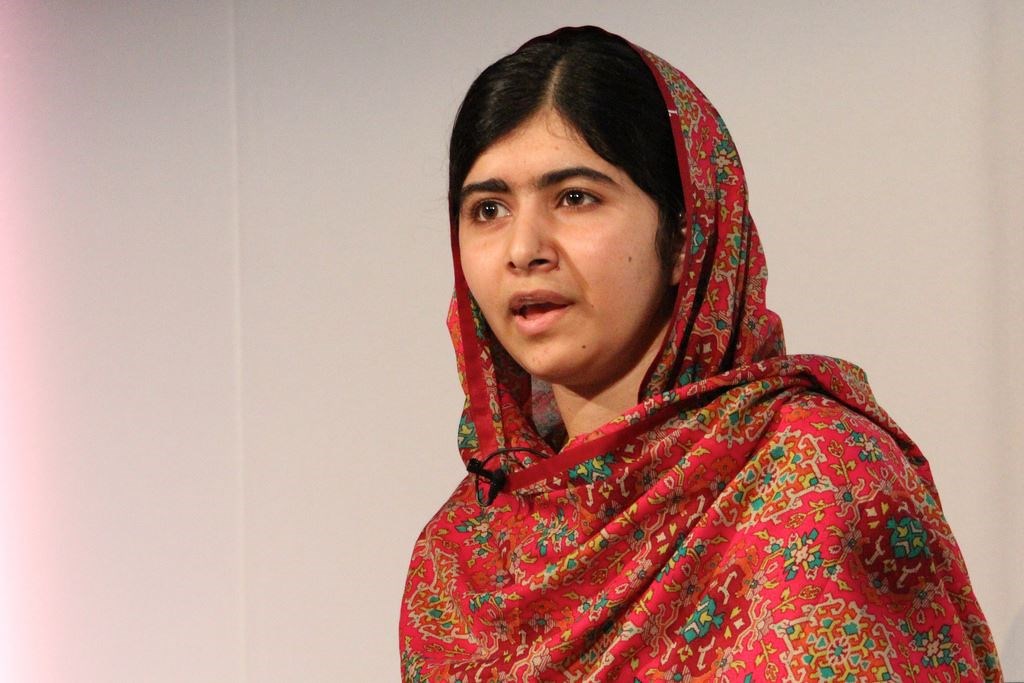 Yousafzai is advocating for female rights at Girl Summit.https://www.flickr.com/photos/dfid/14714344864True heroes are not afraid to stand up for what is right regardless of the consequences just as Yousafzai courageously rose to the occasion and criticized the Taliban. One day, the young child overheard one of her father’s conversations with a BBC representative who wanted a child’s perspective on the Taliban’s dictatorship. Yousafzai jumped at the opportunity to help her people: “In early 2009, Malala started to blog anonymously on the Urdu language site of the British Broadcasting Corporation (BBC). She wrote about life in the Swat Valley under Taliban rule, and about her desire to go to school. Using the name “Gul Makai,” she described being forced to stay at home, and she questioned the motives of the Taliban.” (Nobel Peace Prize Media par. 5). Even though Yousafzai had a fake name under which she operated, there was always the lurking danger of death. Undeterred by her young age and little power, Yousafzai made the valiant choice to stand up to the tyrants in any way she could when others were afraid to ignore the ever looming risks. By writing the blog despite the perils, Yousafzai demonstrated the strength and courage one must have to take action. Like a true inspiration, she fought for what she believed. Furthermore, Yousafzai displayed her valorous character when she outwardly disagreed with the Taliban’s beliefs on a well-known news platform: “The Taliban wanted to ban girls from acquiring an education. However, Yousafzai continued to attend school, but she worried it would be shut down. In 2008, Yousafzai’s father took her to Peshawar, where she gave a speech entitled “How Dare the Taliban Take Away My Basic Right to Education?”(Gale par. 2). Previously, Yousafzai had a guise under which she could hide with her blog, however, this time, she had no such thing. She rose to a higher standard of heroism when she bravely made the decision to speak out about the Taliban whereas others would have not done so as to not incur their wrath. A hero does not look at the risks of action, but rather the beneficial effects it will have on the lives of others. In this incident, Yousafzai demonstrated the resolute mindset needed to help others as she courageously took to the news platform to spread awareness of her district’s problems of suppression. Malala Yousafzai is considered a hero in the eyes of many due to her unfaltering bravery in the face of threats.
Yousafzai is advocating for female rights at Girl Summit.https://www.flickr.com/photos/dfid/14714344864True heroes are not afraid to stand up for what is right regardless of the consequences just as Yousafzai courageously rose to the occasion and criticized the Taliban. One day, the young child overheard one of her father’s conversations with a BBC representative who wanted a child’s perspective on the Taliban’s dictatorship. Yousafzai jumped at the opportunity to help her people: “In early 2009, Malala started to blog anonymously on the Urdu language site of the British Broadcasting Corporation (BBC). She wrote about life in the Swat Valley under Taliban rule, and about her desire to go to school. Using the name “Gul Makai,” she described being forced to stay at home, and she questioned the motives of the Taliban.” (Nobel Peace Prize Media par. 5). Even though Yousafzai had a fake name under which she operated, there was always the lurking danger of death. Undeterred by her young age and little power, Yousafzai made the valiant choice to stand up to the tyrants in any way she could when others were afraid to ignore the ever looming risks. By writing the blog despite the perils, Yousafzai demonstrated the strength and courage one must have to take action. Like a true inspiration, she fought for what she believed. Furthermore, Yousafzai displayed her valorous character when she outwardly disagreed with the Taliban’s beliefs on a well-known news platform: “The Taliban wanted to ban girls from acquiring an education. However, Yousafzai continued to attend school, but she worried it would be shut down. In 2008, Yousafzai’s father took her to Peshawar, where she gave a speech entitled “How Dare the Taliban Take Away My Basic Right to Education?”(Gale par. 2). Previously, Yousafzai had a guise under which she could hide with her blog, however, this time, she had no such thing. She rose to a higher standard of heroism when she bravely made the decision to speak out about the Taliban whereas others would have not done so as to not incur their wrath. A hero does not look at the risks of action, but rather the beneficial effects it will have on the lives of others. In this incident, Yousafzai demonstrated the resolute mindset needed to help others as she courageously took to the news platform to spread awareness of her district’s problems of suppression. Malala Yousafzai is considered a hero in the eyes of many due to her unfaltering bravery in the face of threats.
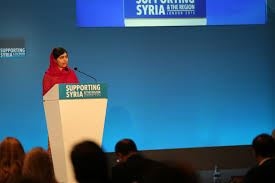 Yousafzai giving speech promoting protection of Syrian refugeesCreator: Adam Brown
Yousafzai giving speech promoting protection of Syrian refugeesCreator: Adam Brown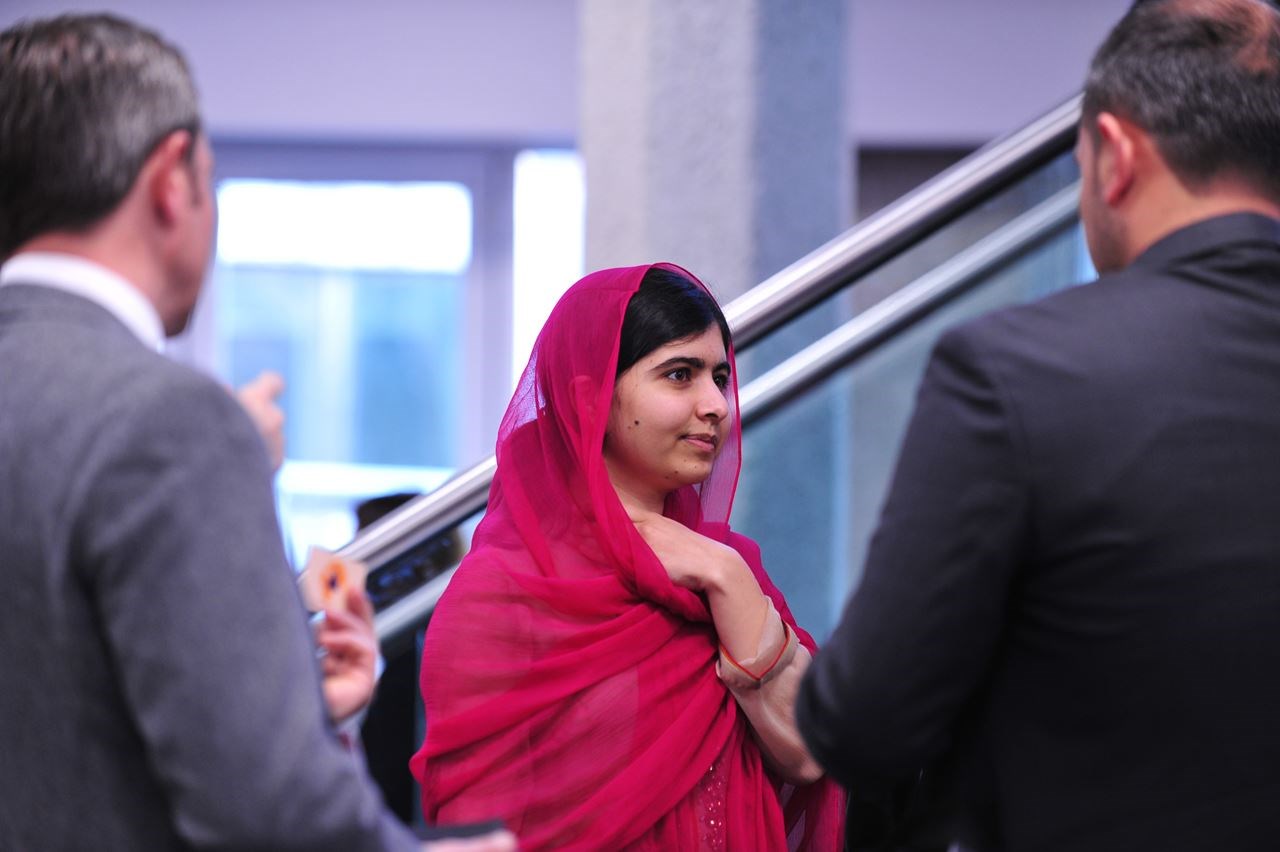 Malala Yousafzai is peacefully collaborating with delegates to help Syrian refugees escape their plight.https://commons.wikimedia.org/wiki/File:Malala_Yousafzai_with_delegates_at_the_Supporting_Syria_and_the_Region_conference_(24188172254).jpgYousafzai is a true hero not only because she was willing to take action, but also because she selflessly took the time and effort to help others and ensure their well being. She once traveled to Nigeria to let young school girls know that they weren’t alone in their pursuit for education: “I spent my seventeenth birthday in Nigeria, showing solidarity with the schoolgirls abducted from their dormitory in the dead of night by Boko Haram militants in April 2014. Those girls were my age and all had dreams of being doctors or teachers or scientists.” (Yousafzai and McCormick 285-286). Yousafzai had sacrificed her birthday and traveled halfway across the world to empathize with the schoolgirls and encourage them to see the bright side of life. She wanted to provide them with a shoulder to lean on even though she had many personal problems as well, including her health. Heroes do not only care about their own happiness, but also the happiness of those around them. They pursue to make a positive change in many lives. By making time and putting in the effort to instill hope in the young girls, Yousafzai proved herself by accomplishing what others did not care to. Furthermore, she demonstrated her philanthropic character when she defended those who could not raise their own voices: “When US president Donald Trump (1946–) signed a travel ban that would prevent refugees from several mostly Islamic nations from entering the country in early 2017, Yousafzai spoke out against the decision, asking the president not to reject refugees who had already lost so much.” (Gale par.11). She used her position as a well-known advocate to spread awareness of the refugees’ problem. Once again, Yousafzai empathized with others and understood that they had no other safe place to travel to. True heroes are those who are concerned for the well being of others and how they will continue to live out the rest of their lives rather than only their own success. By voicing the concerns of those who did not have much influence in society, she demonstrated the caring and helpful mindset one should live life with as she went out of her way to aid refugees, just as a true hero would. Yousafzai demonstrated her admirable heroism by helping those who truly needed it while others went about their daily lives disregarding people’s misfortunes.
Malala Yousafzai is peacefully collaborating with delegates to help Syrian refugees escape their plight.https://commons.wikimedia.org/wiki/File:Malala_Yousafzai_with_delegates_at_the_Supporting_Syria_and_the_Region_conference_(24188172254).jpgYousafzai is a true hero not only because she was willing to take action, but also because she selflessly took the time and effort to help others and ensure their well being. She once traveled to Nigeria to let young school girls know that they weren’t alone in their pursuit for education: “I spent my seventeenth birthday in Nigeria, showing solidarity with the schoolgirls abducted from their dormitory in the dead of night by Boko Haram militants in April 2014. Those girls were my age and all had dreams of being doctors or teachers or scientists.” (Yousafzai and McCormick 285-286). Yousafzai had sacrificed her birthday and traveled halfway across the world to empathize with the schoolgirls and encourage them to see the bright side of life. She wanted to provide them with a shoulder to lean on even though she had many personal problems as well, including her health. Heroes do not only care about their own happiness, but also the happiness of those around them. They pursue to make a positive change in many lives. By making time and putting in the effort to instill hope in the young girls, Yousafzai proved herself by accomplishing what others did not care to. Furthermore, she demonstrated her philanthropic character when she defended those who could not raise their own voices: “When US president Donald Trump (1946–) signed a travel ban that would prevent refugees from several mostly Islamic nations from entering the country in early 2017, Yousafzai spoke out against the decision, asking the president not to reject refugees who had already lost so much.” (Gale par.11). She used her position as a well-known advocate to spread awareness of the refugees’ problem. Once again, Yousafzai empathized with others and understood that they had no other safe place to travel to. True heroes are those who are concerned for the well being of others and how they will continue to live out the rest of their lives rather than only their own success. By voicing the concerns of those who did not have much influence in society, she demonstrated the caring and helpful mindset one should live life with as she went out of her way to aid refugees, just as a true hero would. Yousafzai demonstrated her admirable heroism by helping those who truly needed it while others went about their daily lives disregarding people’s misfortunes.
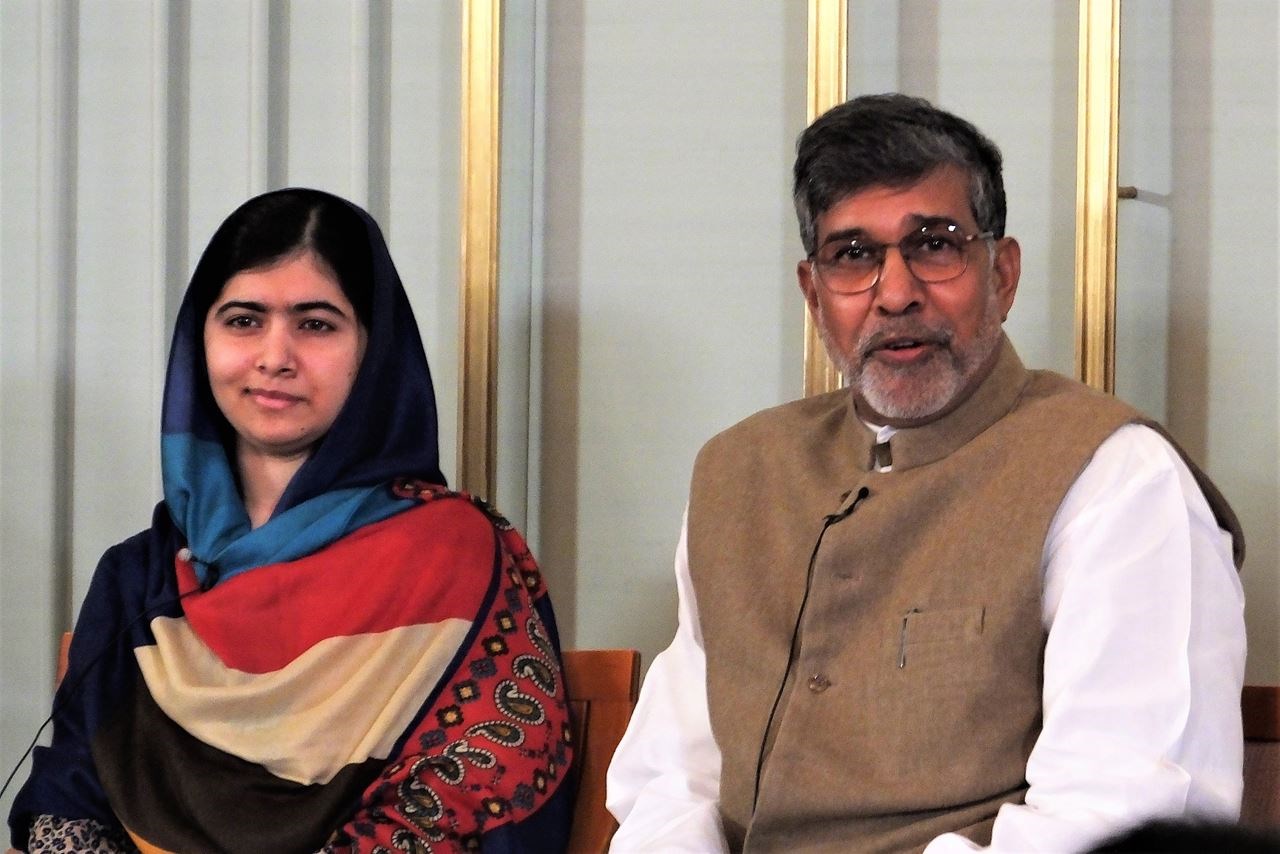 Yousafzai with Kalilash Satyarthi waiting to receive Nobel Peace Prizehttps://commons.wikimedia.org/wiki/File:Malala_Yousafzai_and_Kailash_Satyarthi.jpgMalala Yousafzai serves as an inspiration to many due to her bravery in the face of many obstacles as well as her altruistic behavior towards those who need help. Yousafzai displays her heroic title through her admirable actions. By facing the danger of the Taliban head-on, she portrays her undaunted attitude. In addition to this, Yousafzai illustrates her caring personality as she strives to better the lives of many. She has worked hard and faced many challenges to get her message across. Yousafzai is not a hero because she is famous or has received the Nobel Peace Prize; she is famous because she has worked hard to change the world. She has worked hard to help others dream big like her. She has worked hard to spread awareness because she understands what it is like to be controlled and have joy in life taken away. Yousafzai has always attacked every single problem head-on, never veering away from the hazard and never expecting anything in return. Her penance for all her hard work and dedication is the happiness others gain and with this, she is satisfied. In the speech Yousafzai presented when receiving the Nobel Peace Prize, she said, “‘... I dedicate the Nobel Peace Prize money to Malala Fund, to help give girls quality education, everywhere, anywhere in the world and to raise their voices... And it is my wish and my commitment, and now my challenge to build one [a school] so that my friends and my sisters can go there to school and get quality education and to get this opportunity to fulfill their dreams. This is where I will begin, but it is not where I will stop. I will continue this fight until I see every child, every child in school.’” (Malala Yousafzai Nobel Peace Lecture). This passion with which Yousafzai goes about the matter of girls education is awe striking. It is amazing to see an average everyday girl strive for equality for all girls and not just herself. The work she has dedicated herself to has enabled millions of girls around the world to share their stories and stand up for their rights. Yousafzai has provided many girls with the confidence required to be acknowledged as an equal and not suppressed. Seeing Yousafzai’s persistence and the results of her journey from afar has inspired me to give back to the community and aid others. Currently, I am in an educational club called Education In Action. Every Friday, I go to the public library to help tutor young children. When I think about the satisfaction or happiness my tutee feels when he understands a concept, it makes me feel accomplished to see the effects of my own hard work.Yousafzai’s positive influence on the lives of many inspires me to bring that joy to others and fight for what I believe in. When I grow up, I aspire to be a doctor. However, this is not going to be an easy feat. I know that there will be some that will discourage me in order to hold me back from achieving my goals. However, just as Yousafzai overcame gender stereotypes and suppression, I will rise above the negativity and focus on what I need to do. In the future, I want to go to work and bring a smile to others faces when I tell them that no matter what sickness ails them, there is a solution and that I can provide it. My dream is to live life helping others daily because if we don’t help each other, then who will? Heroes serve as role models as to how we should live our lives. Just as Granger mentioned in his essay, heroes are necessary to motivate us to be better and work harder towards the betterment of society as a whole. Their positive influence on the world reminds us that the people we deem heroes are people who come from society like us. However, they deserve the title hero because unlike people who generally tend to stick to their own lives, these people have gone above and beyond to make a change in other’s lives. Nowadays, true heroes are not being recognized. The teacher that helps you get an A in a class, or the parent that takes time to come to pick you up from school; they are all heroes because they go out of their way to help you and prepare you for success. The true heroes are not those that are recognized for their status in society, but the ones who prove themselves worthy through the way they choose to live their daily lives.
Yousafzai with Kalilash Satyarthi waiting to receive Nobel Peace Prizehttps://commons.wikimedia.org/wiki/File:Malala_Yousafzai_and_Kailash_Satyarthi.jpgMalala Yousafzai serves as an inspiration to many due to her bravery in the face of many obstacles as well as her altruistic behavior towards those who need help. Yousafzai displays her heroic title through her admirable actions. By facing the danger of the Taliban head-on, she portrays her undaunted attitude. In addition to this, Yousafzai illustrates her caring personality as she strives to better the lives of many. She has worked hard and faced many challenges to get her message across. Yousafzai is not a hero because she is famous or has received the Nobel Peace Prize; she is famous because she has worked hard to change the world. She has worked hard to help others dream big like her. She has worked hard to spread awareness because she understands what it is like to be controlled and have joy in life taken away. Yousafzai has always attacked every single problem head-on, never veering away from the hazard and never expecting anything in return. Her penance for all her hard work and dedication is the happiness others gain and with this, she is satisfied. In the speech Yousafzai presented when receiving the Nobel Peace Prize, she said, “‘... I dedicate the Nobel Peace Prize money to Malala Fund, to help give girls quality education, everywhere, anywhere in the world and to raise their voices... And it is my wish and my commitment, and now my challenge to build one [a school] so that my friends and my sisters can go there to school and get quality education and to get this opportunity to fulfill their dreams. This is where I will begin, but it is not where I will stop. I will continue this fight until I see every child, every child in school.’” (Malala Yousafzai Nobel Peace Lecture). This passion with which Yousafzai goes about the matter of girls education is awe striking. It is amazing to see an average everyday girl strive for equality for all girls and not just herself. The work she has dedicated herself to has enabled millions of girls around the world to share their stories and stand up for their rights. Yousafzai has provided many girls with the confidence required to be acknowledged as an equal and not suppressed. Seeing Yousafzai’s persistence and the results of her journey from afar has inspired me to give back to the community and aid others. Currently, I am in an educational club called Education In Action. Every Friday, I go to the public library to help tutor young children. When I think about the satisfaction or happiness my tutee feels when he understands a concept, it makes me feel accomplished to see the effects of my own hard work.Yousafzai’s positive influence on the lives of many inspires me to bring that joy to others and fight for what I believe in. When I grow up, I aspire to be a doctor. However, this is not going to be an easy feat. I know that there will be some that will discourage me in order to hold me back from achieving my goals. However, just as Yousafzai overcame gender stereotypes and suppression, I will rise above the negativity and focus on what I need to do. In the future, I want to go to work and bring a smile to others faces when I tell them that no matter what sickness ails them, there is a solution and that I can provide it. My dream is to live life helping others daily because if we don’t help each other, then who will? Heroes serve as role models as to how we should live our lives. Just as Granger mentioned in his essay, heroes are necessary to motivate us to be better and work harder towards the betterment of society as a whole. Their positive influence on the world reminds us that the people we deem heroes are people who come from society like us. However, they deserve the title hero because unlike people who generally tend to stick to their own lives, these people have gone above and beyond to make a change in other’s lives. Nowadays, true heroes are not being recognized. The teacher that helps you get an A in a class, or the parent that takes time to come to pick you up from school; they are all heroes because they go out of their way to help you and prepare you for success. The true heroes are not those that are recognized for their status in society, but the ones who prove themselves worthy through the way they choose to live their daily lives.
Works Cited
Granger, David. “Boy, Do We Ever Need a Hero.” Esquire, vol. 130, no. 5, Nov. 1998, p. 26. EBSCOhost, search.ebscohost.com/login.aspx?direct=true&db=aph&AN=1220165&site=ehost-live.
"Malala Yousafzai." Contemporary Authors Online, Gale, 2015. Biography In Context
https://link.galegroup.com/apps/doc/H1000313123/BIC?u=powa9245&sid=BIC&xid=8f4250ef. B Accessed 20 Dec. 2018.
"Malala Yousafzai." Gale Biography in Context, Gale, 2012. Biography In Context,
https://link.galegroup.com/apps/doc/K1650008545/BIC?u=powa9245&sid=BIC&xid
=e37a7b62. Accessed 20 Dec. 2018.
“Malala Yousafzai." Gale Student Resources in Context, Gale, 2017. Student Resources In
Context,
https://link.galegroup.com/apps/doc/PBTIMW863742142/SUIC?u=powa9245&sid=SUIC&xid=5c0df0ee.Accessed 2 Jan. 2019.
Malala Yousafzai – Nobel Lecture. NobelPrize.org. Nobel Media AB 2018. Sun. 30 Dec
2018. https://www.nobelprize.org/prizes/peace/2014/yousafzai/lecture/
Malala Yousafzai – Nobel Lecture. NobelPrize.org. Nobel Media AB 2019. Thu. 14 Feb
2019.
<https://www.nobelprize.org/prizes/peace/2014/yousafzai/lecture/>
Yousafzai, Malala, and Patricia McCormick. I Am Malala: Young Reader's Edition. How One
Girl Stood up for Education and Changed the World. Little, Brown and Company, 2015.
Page created on 2/14/2019 4:15:02 AM
Last edited 2/14/2019 5:56:24 AM
